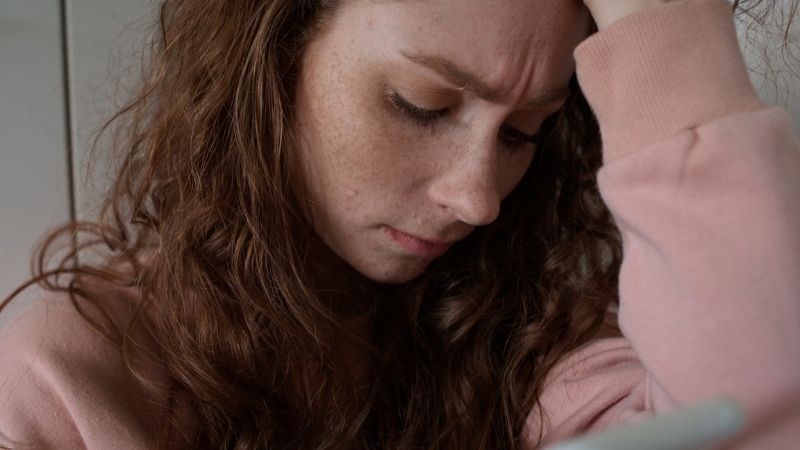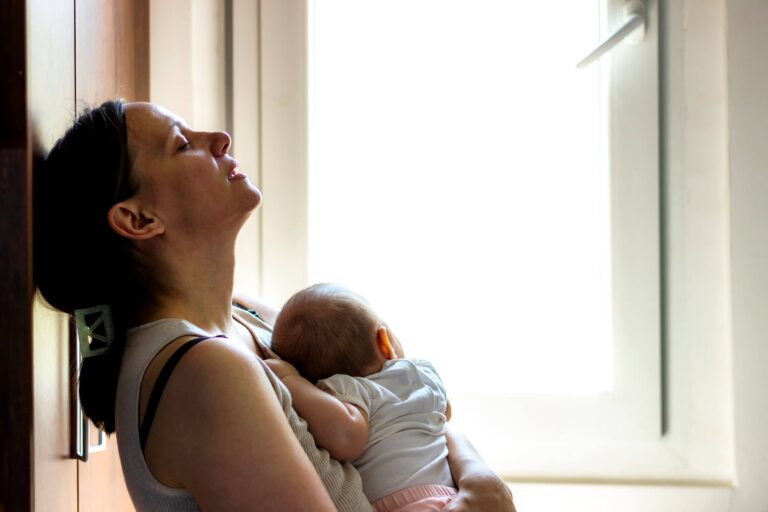Bringing a baby into the world is a life-changing experience. Many new mothers feel joy, but some struggle with sadness, stress, or exhaustion. Postpartum depression affects many women, making daily life feel overwhelming.
Natural methods can help lower the risk and improve emotional well-being. A strong support system, healthy food, and simple lifestyle changes can make a big difference.
Learning how to care for both the body and mind can help new mothers feel more balanced and in control.
Key Takeaways
- Postpartum depression happens due to hormonal shifts, stress, and lack of sleep, but natural methods help reduce the risk.
- Eating nutrient-rich foods, staying active, and getting enough rest support emotional and physical recovery.
- A strong support system and early intervention make a big difference in a mother’s well-being.
Why Some Mothers Struggle After Birth
Many mothers experience emotional shifts after childbirth.
Dr. Samantha Meltzer-Brody, Director of the Perinatal Psychiatry Program at the University of North Carolina, states:
“The cause of postpartum depression is unknown. Hormonal and physical changes, personal and family history of depression, and the stress of caring for a new baby all may contribute to the development of postpartum depression.”
Hormonal Shifts

Estrogen and progesterone levels drop dramatically after birth, which can lead to mood swings, anxiety, and fatigue.
The sudden change affects brain chemistry and may trigger depressive symptoms. Some women also experience fluctuations in thyroid hormones, leading to tiredness and mood instability.
Psychological and Social Factors
Several life circumstances increase the risk of postpartum depression:
- A history of depression or anxiety
- High stress during pregnancy
- Low self-esteem or feelings of unpreparedness
- Lack of emotional or financial support
- Struggles with breastfeeding or newborn care
- Traumatic birth experiences
Dr. Katherine Wisner, a perinatal psychiatrist, explains, “A woman with a personal or family history of depression, exposure to major stress, or a poor support system is more vulnerable to postpartum depression.”
Sleep Deprivation
Newborns require constant care, which disrupts normal sleep cycles. Mothers who struggle to get adequate rest often experience heightened emotional distress.
Dr. Wendy Davis, an expert in maternal mental health, says, “Lack of sleep fuels emotional instability. Moms need help and rest to recover properly.”
Recognizing Early Signs
Early detection of postpartum depression makes a significant difference. Healthcare professionals encourage family members to watch for symptoms such as:
- Persistent sadness or hopelessness
- Extreme fatigue beyond normal exhaustion
- Difficulty bonding with the baby
- Loss of interest in daily activities
- Feelings of guilt or worthlessness
Food That Supports a Healthy Mind
Mothers need proper nutrition after birth to recover and maintain emotional balance. Certain foods help improve mood, boost energy, and support overall health.
Omega-3 Fatty Acids

Omega-3s, found in salmon, walnuts, and chia seeds, play a key role in brain function. These healthy fats support cognitive health and may lower the risk of depression. Dr. Emily Deans, a nutritional psychiatrist, states, “Low omega-3 levels have been linked to higher rates of depression, especially in new mothers.”
Foods That Help the Brain
Certain foods contain nutrients that improve mental well-being.
- Tryptophan-rich foods – Found in turkey, eggs, and cheese, tryptophan helps the brain produce serotonin, which improves mood.
- Leafy greens – Spinach and kale provide folate, a nutrient linked to lower depression risk.
- Whole grains – Brown rice and oats give the body steady energy, preventing mood swings.
Importance of Hydration
Water helps the body recover and keeps the mind clear. Dehydration leads to fatigue, anxiety, and irritability. Drinking enough water every day prevents these issues and improves overall well-being.
Eating nutrient-dense foods and drinking enough water makes a major difference in postpartum recovery. Simple diet changes help mothers feel stronger, more focused, and emotionally balanced.
Movement Brings Back Strength and Energy
Physical activity after childbirth helps new mothers recover faster and improves emotional well-being. Moving the body boosts energy, reduces stress, and supports long-term health.
Benefits of Postpartum Exercise
Exercise releases endorphins, natural chemicals that improve mood and reduce anxiety. Studies show that moderate exercise lowers the risk of postpartum depression.
Dr. Kathleen Kendall-Tackett, a health psychologist, states, “Exercise is a powerful tool for reducing stress and improving mental health in new mothers.”
Regular movement strengthens muscles, increases circulation, and supports hormonal balance.
Dr. James Clapp, an obstetrician, explains, “Women who stay active after pregnancy experience less fatigue and fewer mood disturbances.”
Simple Exercises for New Mothers
- Walking – A gentle way to increase circulation and boost mood
- Pelvic floor exercises – Strengthens muscles that support bladder and uterus
- Stretching – Relieves tension and improves flexibility
- Yoga – Encourages relaxation and emotional balance
Moving Safely After Birth
Every mother heals differently. Doctors recommend starting with light activity and listening to the body. Women who had C-sections or complications should consult a healthcare provider before resuming exercise. Pushing too hard too soon can cause setbacks.
Rest Heals the Body and Mind

Sleep plays a critical role in postpartum recovery. Lack of rest increases stress, weakens the immune system, and contributes to emotional struggles.
Dr. Shelby Harris, a sleep specialist, explains, “Sleep deprivation affects mood, memory, and the ability to cope with daily challenges, making postpartum depression more likely.”
Why Sleep Feels Impossible for New Mothers
- Newborns wake frequently for feeding and comfort
- Hormonal shifts cause restlessness
- Anxiety about baby care disrupts sleep cycles
- Household responsibilities add to exhaustion
Ways to Get More Rest
- Sleep when the baby sleeps – Even short naps improve energy and focus
- Accept help – Allow trusted family or friends to care for the baby
- Limit screen time before bed – Blue light affects melatonin levels, making sleep harder
- Create a bedtime routine – A warm bath, soft lighting, and quiet time prepare the body for rest
Stress Grows When Ignored

Postpartum stress builds up from lack of sleep, hormonal changes, and the pressure of caring for a newborn. If left unchecked, stress can lead to exhaustion and emotional struggles.
Dr. Elizabeth Cox, a clinical psychologist, states, “Chronic stress after childbirth increases the risk of postpartum depression and makes everyday tasks feel overwhelming.”
Ways to Reduce Stress
- Take deep breaths – Slow breathing calms the nervous system
- Find small moments of quiet – Even five minutes of silence makes a difference
- Listen to music – Soothing sounds lower anxiety and promote relaxation
- Keep expectations realistic – No one gets everything done perfectly
FAQs
How long does postpartum depression last?
The duration varies for each mother. Some experience symptoms for a few weeks, while others struggle for months. Without treatment or support, postpartum depression can persist for a year or longer. Seeking help early improves recovery.
Can hormonal changes alone cause postpartum depression?
Hormones play a role, but they are not the only factor. Psychological stress, lack of sleep, previous mental health conditions, and a weak support system also contribute. A combination of these elements often leads to postpartum depression.
Does postpartum depression only affect first-time mothers?
No, postpartum depression can affect any mother, regardless of whether it is a first pregnancy or not. Some women experience it with one child but not another, depending on life circumstances, support, and overall health.
Are natural remedies enough, or should professional help be considered?
Natural methods help many mothers, but they may not be enough for severe cases. If symptoms persist, worsen, or interfere with daily life, professional support is necessary. Therapy, medication, or both may be recommended.
Can postpartum depression affect the baby?
Yes, when left untreated, postpartum depression can impact bonding, breastfeeding, and overall infant care. Babies may become fussier or less responsive. Seeking help benefits both mother and child.
The Bottom Line
Postpartum depression affects many mothers, but natural methods can help reduce the risk and support recovery. Proper nutrition, regular movement, quality sleep, and emotional support all play a key role in maintaining mental health. Recognizing early signs and making small, daily adjustments improve both physical and emotional well-being.
Every mother deserves care, rest, and support. Seeking help is not a sign of weakness—it is a step toward healing. Prioritizing health allows mothers to enjoy time with their baby while feeling strong, capable, and emotionally balanced.
References
- The Journal of Clinical Psychiatry – The Perinatal Depression Treatment Cascade: Baby Steps Toward Improving Outcomes
- Modern Mommy Doc – How moms can get better sleep without medication with dr. Shelby Harris
- National Institutes of Health – Long-term outcome after exercising throughout pregnancy: fitness and cardiovascular risk
- National Institutes of Health – The Identification of Postpartum Depression
- National Institutes of Health – The Role of Reproductive Hormones in Postpartum Depression

